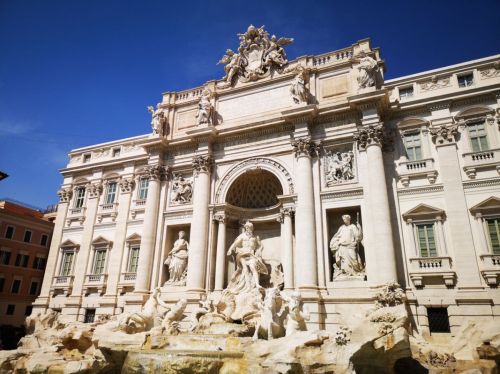The man had enormous amounts of ambition, which he pursued laboriously throughout his life. His methodical approach to working on his career, his ability to form alliances and sabotage the political moves of his opponents, combined with his excellent tactical talent, led Julius Caesar to the pinnacle of power in Rome.
His effectiveness and growing influence instilled fear among Roman senators, who feared the transformation of the republic into a monarchy. This led to the formation of a conspiracy against him, which ended with the murder of the aspiring emperor. Although the conspirators were convinced that the killing of Caesar would save Rome from regime change, in reality, it only delayed the establishment of the Roman Empire for several years.
He came from a family of urban patricians with medium political influence in the city. His parents were Gaius Julius Caesar the Elder and Aurelia Kotta.
In 85 BC, his father died suddenly, making the sixteen-year-old Julius have to become the head of the family.
There is no conclusive evidence, however, the premise is based on Plutarch's account. Current medical knowledge, however, inclines that malaria, a parasitic brain disease or hypoglycemia was responsible for the causes of the politician's seizures.
He obtained this position in late 87 or early 86 BC.
This was the highest priest in Rome, overseeing all religious life. The office also provided considerable political influence which was most important to Julius Caesar.
Cornelia was the first wife of Julius Caesar, entering into marriage when she was 14 years old. From this marriage came Caesar's only legitimate child, Julia. The marriage to Cornelia lasted about thirteen years, and she died suddenly in 69 or 68 BC. The cause of death is unknown, however, the most common hypothesis is that she may have died in childbirth.
After Cornelia's death the very next year, he married Pompeia, whom he divorced six years later as a result of the scandal of the Bona Dea festivities that Pompeia presided over. The festivities were reserved exclusively for women, but in 62 BC a certain Clodius, disguised as a woman, entered the temple grounds to seduce Pompeii. Clodius was exposed and the affair that erupted over the insult to the goddess shocked all of Rome.
Two years after divorcing Pompeia, Caesar married Calpurnia, 24 years younger, who remained his wife until Caesar's tragic death.
He managed to consolidate scattered Roman troops, gather mercenaries, and repel the aggressors, led by Mithridates VI Eupator.
He took over as governor of the province of Hispania Ulterior, where he decided to conquer regions not yet occupied by Rome. After initial difficulties, he annexed new territories and gained the title of emperor.
The position of consul was one of the two highest posts in the republic. The term of office lasted one year and the responsibilities were broad foreign policy. Despite resentment and numerous acts of corruption aimed at Caesar, he took office by defeating the conservative Marcus Calpurnius Bibulus. He held the post four more times, in 48, 46, 45 and 44 BC.
Although the offensive against the Britons conducted in 54-53 BC did not bring tangible benefits, he gained recognition for carrying out such a logistically difficult military operation. Despite the success of his career, Julius Caesar experienced a much more significant loss - while he was in the British Isles, his daughter Julia died.
He dealt with the insurgents in a brutal, bloody but effective manner. In the emperor's favor were internal divisions within the Gaulish factions, which, despite similar numbers of troops, were unable to face the Roman legions. The exact outcome is unknown; Plutarch claimed that Caesar fought three million enemies of which he exterminated one million and enslaved one million while subjugating 300 clans and destroying 800 cities. These figures are certainly overestimated.
Caesar, however, showed honor and chivalry by donating the lives of defeated opponents, which distinguished him from the behavior of Pompey, who condemned those captured to death. Caesar also offered tangible benefits to his former opponents if they were willing to support him. In this way, he quickly gained partisans in the Senate and the scales of victory tipped to his side. After the victorious battle, Caesar gained the position of dictator for a year.
Seeking rescue on the other side of the Mediterranean, however, he fell into the worst possible position in Alexandria. The then ruler of Egypt, Ptolemy XIII fearing the harmful influence of the Roman commander had Pompey assassinated. According to legend, when Caesar reached Alexandria he was handed the head of his opponent, and upon seeing it he wept and kissed it on the forehead.
The so-called Alexandrian War was fought between the supporters of Ptolemy XIII and his sister Cleopatra VII, to whom Caesar had promised to exercise power on an equal footing with his brother. Ptolemy's advisor Pothejnos did not like this idea and decided that with an army of 20.000 soldiers, he could easily defeat Caesar's 4000-strong army. Being trapped, Caesar called for reinforcements, which arrived from Rome, Syria, and Judea. In the decisive clash, Ptolemy XIII was killed and Cleopatra became queen of Egypt.
He was the last ruler of ancient Egypt and was killed on Octavian Augustus' orders when he invaded Egypt in 30 BC. Likely, Cleopatra was also assassinated on Octavian's orders, although according to Plutarch she committed suicide.
This battle took place after the end of the Alexandrian War and Caesar's departure from Egypt. However, it was not Caesar's last military success before returning to Rome.
Caesar's 10 legions were led by Scipio's 10 legions supported by 2500 units of Numidian cavalry and 60 war elephants. According to reports, the battle ended in a total victory for Caesar, whose losses were about 50 men while the combined Pompeian and Numidian armies lost 10.000 men. After such a spectacular victory, Caesar's return to Rome guaranteed him unquestionable power and splendor.
Caesar was appointed dictator for the next 10 terms and thus for 10 years.
The city held several days of games, festivals, and revelry and Julius Caesar lavished the citizens of the city with numerous spoils of war. There was also a great hunt with the participation of 400 lions, a naval battle on the Fields of Mars of Rome, and a great battle of captives on the Circus Maximus.
Each army consisted of 2000 men, 2 horsemen, and 20 war elephants. Some people considered such behavior of Caesar an exaggeration and riots broke out in the city, which Caesar managed to quell only with the help of priests.
To this end, the resettlement of veterans of wars and the Roman plebs in the conquered provinces, mainly in Gaul, Asia Minor, and Africa, began. In addition, the term of office of provincial governors was reduced to two years, associations that could become cradles of conspiracies were dissolved, and land reform was carried out to the end.
On the one hand, he strengthened it during his victorious military campaigns; on the other hand, by his actions, he weakened the position of other politicians and offices in Rome. This contributed to concerns about the future of the republic and its transformation into a monarchical system.
On that day Gaius Cassius Longinus and Marcus Junius Brutus met, and during their conversation, they concluded that Caesar's position was strengthening dangerously and something had to be done to protect Rome from his authoritarian rule. In later days, the recruitment of more rebels began. The number of conspirators could not be too small for them to have the ability to successfully carry out an assassination attempt, but not so large as to be easily deconstructed. According to reports from the time, between sixty and eighty people were successfully involved in the conspiracy within three weeks.
In the morning she told him of her fears and asked him not to go to the Senate that day. After much persuasion, Caesar agreed to stay home, but his closest friend Decimus Junius Brutus finally persuaded him not to be frightened by the "monstrous visions of a woman" and took part in the proceedings.
This was a lavishly celebrated holiday dedicated to the Roman god of war, Mars. On this day, the Roman Senate met in Pompey's Theater, not in the Roman Forum where it usually took place. The reason for the change of venue was the renovation of the Roman Forum, carried out at the behest of and with funds from Caesar.
Of all the blows inflicted on him, only one was fatal, the second stab to the chest which pierced the aorta. The cause of death was therefore excessive blood loss. The first, ineffective blow from behind was dealt to Caesar by Publius Servilius Casca. Surprised, Caesar shouted the words "Casca, you villain, what are you doing?" in the assassin's direction. The terrified assassin cried out for help and at that moment a hail of blades rained down on Caesar.
According to Svetonius and Plutarch, Caesar remained silent and only covered his head with a toga when he saw his friend Brutus among the assassins.
Deification is the attribution of divine qualities to a mortal. He was posthumously given the title Divus Iulius (divine Julius) by decree of the Roman Senate on January 1, 42 BC.
The author of the calendar was the Greek astronomer Sosygenes and it was introduced in 45 BC. The calendar established a year of 365 days with an additional leap day every 3 years. It was not until 8 AD that a leap year was introduced every 4 years. Before the introduction of the Julian calendar, there was a 304-day Roman calendar, which separated the previous year from the next with a 61-day winter period.
Another, August (augustus) was dedicated to Octavian Augustus in later years.












